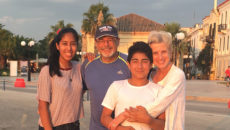We were in the grocery store one day when Gobez, my nine-year-old son, adopted from Ethiopia, started throwing punches at me, trying to stir up a pretend boxing match. He was in that wild rumpus kind of mood that grips little boys sometimes, and I felt myself edging toward panic. Although he’s only in fourth grade, Gobez is nearly 5’1″ and carries 100 muscular pounds—we are practically the same size. I felt scared, but not because I thought Gobez would hurt me; he wouldn’t. I feared that observers wouldn’t realize that we were mother and son. That someone would misinterpret what was happening between a black boy and a white woman and call the cops.
As parents, we live in constant tension: How thoroughly should we prepare our kids for the ugliness that exists in the world? How carefully should we guard their innocence? Friends—usually white friends—have suggested that I obsess about race, racism, and racial profiling too much. But the recent, horrific killing of teenager Trayvon Martin in Florida has served as a raw reminder that when it comes to racism, parents of black children can’t afford to be vague.
After our “brawl” at the grocery store, I told Gobez that I’d been afraid for him when he pretended to punch me. He needs to be aware of the kind of perilous misunderstandings that can arise due to racism. Although I want him to respect police officers for their service, he also needs to understand racial profiling.
I’ve explained to Gobez that his public behavior will be held to a higher standard than that of his white peers. Right now, this means no punching in the supermarket; before long, it will encompass driving more carefully than the average teenager. Above all, he must do everything possible to avoid interactions with law enforcement. Although he’s still a little boy, we’ve already discussed how to handle potential police encounters: Keep your hands in plain sight and don’t reach for anything. Stay calm and follow instructions. Be polite.
I try to temper these warnings with information and experiences that foster pride in my son’s race and heritage, so that he sees that he’s not to blame for the ugly way things are. He needs to protect himself, but the world also needs to change, and slowly things are getting better.



